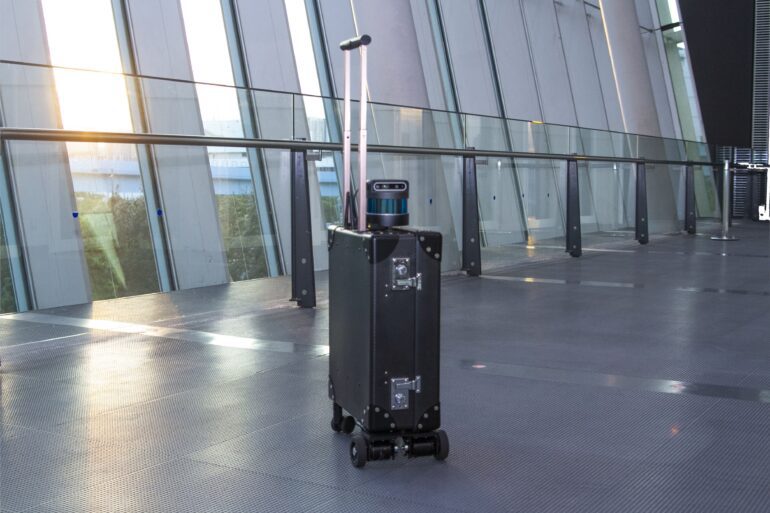TL;DR:
- Japanese researchers and companies created the AI Suitcase, a guidance robot for the visually impaired.
- The AI Suitcase undergoes successful overseas public trials, generating significant interest.
- It surpasses traditional smartphone guidance systems with enhanced safety and environmental awareness.
- The AI Suitcase’s creator, Chieko Asakawa, envisions a future of increased independence for visually impaired travelers.
- Positive feedback from trial participants and business analysts highlights its potential impact.
Main AI News:
The collaboration between Japanese researchers and companies has given birth to a remarkable innovation – the AI Suitcase, a guidance robot designed to assist blind or partially sighted travelers in navigating their surroundings effortlessly. Recently, this groundbreaking technology underwent its first overseas public trial, attracting significant interest and sparking discussions about its potential practical applications.
The trial took place at a hotel in Anaheim, California, where participants witnessed the English voice of the AI Suitcase emanating from a smartphone, confidently declaring, “System starts. Set destination.” One of the trial participants, Hector Elias, a blind employee from a major U.S. financial institution, eagerly grasped the handle of the compact four-wheeled suitcase that would serve as his trustworthy guide. With the destination set as a guest room a short distance away, Elias embarked on his journey.
During the test, the development team demonstrated the device’s impressive capabilities. To make a right turn down a corridor, a button on the right side of the suitcase’s handle vibrated, alerting Elias to change directions. Furthermore, when a cleaner appeared ahead, the AI Suitcase’s advanced sensors detected the presence and paused accordingly. Elias expressed satisfaction with the test’s performance and expressed a desire to try it at nearby Disneyland in the future.
The mastermind behind the AI Suitcase is Chieko Asakawa, a distinguished engineer at IBM and the current director of the National Museum of Emerging Science and Innovation, Miraikan, in Tokyo. Alongside Asakawa, four companies, including Kyoto-based Omron, have collaborated on the development of this remarkable device.
The AI Suitcase boasts features that surpass those found in traditional smartphone guidance systems, focusing on enhanced safety and environmental awareness. By proactively anticipating the user’s movements, this self-propelled suitcase ensures a seamless navigation experience, while its integrated sensors carefully assess the surroundings, guaranteeing a reliable and efficient travel companion.
Asakawa, who lost her eyesight at the age of 14 due to an injury, envisions a future where visually impaired individuals can freely “walk around museums at their leisure and thoroughly enjoy traveling alone.” The sentiment resonated with Amos Miller, the president of an IT venture and a former Microsoft engineer who is also blind. Miller remarked, “The benefit of a system that guides you to your destination, especially in unfamiliar places, is great.“
Asakawa and her dedicated development team have conducted numerous tests of the technology at various locations, including Miraikan and Coredo Muromachi, a bustling commercial facility in Tokyo’s Nihombashi district. The decision to conduct public overseas trials was fueled by a sense of urgency to make this technology viable not only in Japan but also on an international scale.
Asakawa emphasized the importance of gathering insights and feedback from individuals worldwide, stating, “It is crucial to have people from all over the world understand the technology, so we go out and listen to what they have to say.” The trial garnered diverse opinions, ranging from the technology’s adaptability for individuals with different physiques to its performance in crowded spaces.
Conclusion:
The AI Suitcase’s successful overseas trial marks a significant breakthrough in the assistive technology market. Its innovative features, surpassing traditional solutions, demonstrate great potential for improving the travel experiences of visually impaired individuals worldwide. As this technology continues to evolve and gain traction, it presents exciting opportunities for companies in the assistive technology sector to create groundbreaking products and cater to an underserved market segment.

